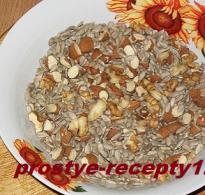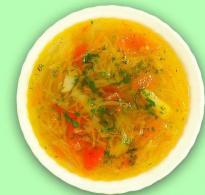Can the eggplant dish be bitter? How to remove bitterness from eggplant
Eggplant dishes are popular all over the world. Useful trace elements that make up the vegetable have a beneficial effect on the functioning of the cardiovascular system, liver and kidneys. Eggplant breaks down body fat, so it is included in the diet during fasting and weight loss diets.
Fresh vegetables differ from those stale on the counter of stores with a smooth and shiny skin. The color is bright, glossy and without extraneous stains. Such young "blue ones" are suitable for cooking any dishes. Their flesh is tender, and the taste is pleasant.
But it is not always possible to buy goods "from the garden". Stale vegetables, unlike young ones, have a slight bitterness. How to remove bitterness from eggplant so as not to spoil the taste of your favorite dishes?
We offer 5 popular and effective ways:
- soaking in cold water;
- soaking under pressure in a saline solution;
- sprinkling with coarse salt;
- peel pruning;
- 2 minute boil.
There is also a sixth method, but we will reveal its secret at the end of the material.
To begin with, put the little blue ones in a container of warm water and rinse thoroughly. Remove the vegetable, cut off the edges and pat dry with a kitchen towel.
Taste the ingredient. If bitterness is present, we must get rid of it.
How to remove bitterness from eggplant before cooking?
The blanks are washed and cut, now we select a convenient way to neutralize the bitterness.
Let's take a closer look at all the options:

- How to soak eggplants from bitterness - ice water. Soaking with cold water is suitable for preparing eggplant "for tomorrow". Place whole vegetables in a bowl and cover with liquid. Leave overnight. In the morning, remove, squeeze out excess moisture and pat dry with a towel. Now it remains only to chop, add salt and send to the pan.
- The second way is soaking under oppression in salt water. How much to soak eggplant to remove bitterness? This procedure will take 1 hour. Prepare a saline solution in the ratio of 1 tbsp. l. salt + 1 liter of water. Cut the blue ones lengthwise and put them in a bowl. Fill with salt water and press with oppression. After the time has elapsed, remove the halves and rinse with clean tap water. Place on a kitchen towel or in a colander to get rid of excess liquid.
- Before frying, chop the blue ones into 5 mm - 1 cm circles. Place in a deep bowl and sprinkle with rock or iodized salt. Leave the granules to dissolve for 20 minutes, then rinse the mugs thoroughly with running water.
- The bitterness comes from the peel. Therefore, if the recipe does not contradict, carefully remove it with a sharp knife. Thin layer, without affecting the pulp.
- If you are going to cook a stew or puree soup - those dishes where the shape of the ingredient does not matter, use boiling. Pour water into a saucepan and place on a gas stove to heat. At this time, cut the eggplants into medium cubes and send them to a boiling container. After 2 minutes, remove from heat and pour the contents of the saucepan into a colander to get rid of excess liquid. When the water drains, start cooking. Using this method, you do not have to soak the product for a long time.
- The secret of the sixth method is freezing. This option is great for winter use. Prepare blue ones for future use, because in winter it is unlikely that you will be able to eat your favorite vegetable. Cut the pulp with the peel into rounds or cubes. Fold in plastic bags in portions - for 1 time. Send to the freezer. And in winter, when you want to eat something special, take out frozen blanks, let them go and prepare a vitamin meal.
And since we are talking about cooking, in the end we give you a spicy dish of fresh eggplant with tomatoes and garlic-mayonnaise sauce.
Delicious cold eggplant appetizer

Prepare 2 medium aubergines and a medium sized ripe tomato as needed. For lubrication - garlic and mayonnaise. For frying - vegetable oil and flour. Cut the "blue" circles, sprinkle with salt and mix. Let it brew for 20 minutes. Now rinse under the faucet with cold water. Lay on a towel.
Chop the tomatoes into circles. In a separate bowl, mix mayonnaise with grated garlic. Choose the amount of garlic to taste. Pour sunflower oil into a frying pan and heat.
Eggplant is a southern plant, not common in our harsh climate. A vegetable brought from India by the ubiquitous Arabs appeared in Europe only in the 15th century, and even in Russia today it is exotic. It has been appreciated so far mainly in the southern regions, in the Krasnodar Territory and in the Stavropol Territory.
Relatives to tomatoes and potatoes
Did you know, for example, that eggplant is a berry? It is nightshade, a close relative of tomatoes. And potatoes, of course. Like potatoes, it is prone to Colorado beetle raids and late blight, but not at all so unpretentious in cultivation. Loves warmth, moisture and rich soil. The subtropics are somehow more to his liking than our middle lane. But Russian breeders and hardworking summer residents have managed to adapt to the requirements of the sissy, and the “blue ones” are successfully winning the hearts and stomachs of our compatriots.
Eggplant fruits, by the way, are not necessarily blue. When ripe, they generally range from gray-green to brown-yellow. But no one eats them ripe - they are rough and inedible, and they also accumulate solanine. They are eaten unripe when they are lilac and purple. However, varieties are bred and very light ("golden egg", "white egg"). There are large and very small, pear-shaped, spherical and cylindrical.
Eggplants are fried, boiled, stewed, baked, stuffed, pickled, grilled, chopped into caviar, eaten raw. "Vegetables of longevity", as they are called in the East, are really shown to the elderly, especially to the cores - there is a lot of potassium in them. In addition, fats break down, therefore they are respected by those who are trying to lose weight and by those who are predisposed to atherosclerosis, metabolic disorders, diseases of the gastrointestinal tract, kidneys and liver.
It upsets that they are bitter. Are they bitter?
The main chagrin of experienced housewives and cooks is that eggplants are bitter. Who likes to eat bitter? Are they bitter? It is curious that people of the older generation claim this. And young people are surprised: yes there are no bitter eggplants!
It turns out that everything is very simple. Indeed, once the plant gave bitter fruit. But breeders have done their best, and new varieties do without this drawback. However, everything here is like with cucumbers: there are bitter ones, there are non-bitter ones. Depends on growing conditions. Bitter fruits that suffered during the period of growth from cold and lack of moisture. And overripe. Here are the “blue ones”, which grew in summer cottages in warmth and comfort, watered and fell off in time, they do not give bitterness.
And in supermarkets they sell greenhouse fruits of non-bitter varieties. Although in taste, of course, they are inferior to those grown in the ground. But you need to choose fruits of small size, with blunt noses and immature, with small light seeds.
Cook eggplant without bitterness
But what to do if you are unlucky and you bought bitter eggplants. How to cook eggplant so that it does not taste bitter?
Method one, "bald"
Just take off the skin.
Method two, "wet"
Soak in cold water. If cut - for half an hour, whole - for two hours. By adding salt to the water (two tablespoons per liter of water), you can quickly achieve the desired effect.
Method three, "salty"
Cut and sprinkle with salt. After half an hour, squeeze out the allocated juice.
Alternatively, you can sprinkle chopped vegetables with salt and pour boiling water over them. After three to five minutes, drain the water and dry the eggplants.
If the recipe calls for whole fruits (say, you are going to stuff them), you can throw eggplants in salted boiling water for a couple of minutes.
Or do so. Cut off the ends, put the top on a layer of salt a centimeter thick. After half an hour, turn over and put upside down, also for 30 minutes. If the recipe allows, cut the eggplant in half lengthwise and lay on the salt. Just rinse well afterwards to remove excess salt!
And one more little secret. Eggplants have the unpleasant property of absorbing, like a sponge, vegetable oil when frying. Soaking also helps to cope with the problem of excess fat. The fruits are cut, soaked in salt water for 20 minutes and squeezed. Then they will take significantly less oil.
Now that you know several ways to cook eggplant without bitterness, it's time for recipes for incredibly delicious dishes from this product.
The ability to cook deliciously, like any other talent, develops, comes with experience. And every hostess has her secrets. It will never be superfluous to replenish the piggy bank of your recipes. Especially if the topic concerns dishes from "capricious" vegetables and fruits, for example, eggplant.
How to choose the right eggplant
Not every novice housewife will be able to cook "blue ones" deliciously. These unusual vegetables can rightfully be considered capricious. It is necessary not only to be able to choose the right fruits, but also to know how to remove the bitterness of eggplant.
What is important when choosing and preparing them:
- fruit size;
- color;
- the state of the pulp;
- proper preparation before heat treatment.
It is important not only to know not to be bitter, but also to be able to choose them. The taste of your dish will depend on the quality of the fruit. Choose "blue" medium size. Too large fruits can be not only overripe, but also sluggish inside. Small ones are fine if you plan to make caviar or stew. The color of the eggplant should be uniform, without white spots and stripes. If there are any, then you should not buy such products, they are most likely overripe.
Young and fresh eggplants do not have any bitterness. Only old fruits or those that have lain on the counter for more than one day can acquire an unpleasant aftertaste. Someone considers this bitterness a piquant feature of this vegetable. But for the most part, cooks and housewives agree in one opinion: before cooking, it is worth removing the bitterness of eggplant.
After you have washed the fruits, cut off the tails. And pay attention to the pulp of the "blue". If, when cutting the eggplant across with a knife, you clearly feel that there is something inside, press lightly with your finger on the fleshy part. It should be soft, without hard fibers. In a simple way they are called "needles". If your finger stumbles upon such fibers, then the whole fruit is not suitable for use. Next, suitable eggplants can be peeled and cut into cubes, straws or slices.
What to do with eggplant before heat treatment
Now you can begin the process of getting rid of the pulp from an unpleasant aftertaste. There are two ways to remove the bitterness of eggplant: dry and wet.
The first option is to remove the seeds. Professional chefs claim that this will be quite enough for the bitterness to go away. If the pulp is already so small, and it’s reluctant to mess with the seeds, then you can simply salt the chopped fruits. Then you need to cover them and leave for an hour and a half. The salt draws out the bitter juice.

In the second option, you need to know, You can do this in two ways: in milk or in brine. So, a tablespoon of salt is put per liter of water. Milk does not need to be salted. Pour the prepared pulp and put a plate on top so that the eggplant does not float. Leave for 2-3 hours. Then drain the liquid and discard the vegetables in a colander. While you are sautéing the frying, excess moisture will drain.
An alternative way to get rid of bitterness

How to cook eggplant so that it does not taste bitter? Another option is to freeze them. Put the chopped pulp in the freezer for the night or for four hours. After you take it out and wait for it to thaw. The taste will come out with the juice. Just keep in mind that after this method, only caviar can be cooked from eggplant. During heat treatment, they will turn into puree very quickly. Of course, if you like stews in which vegetables are partially boiled, then you can use them there too. Please note that freezing deprives many foods of their original qualities, which are important in the preparation of certain dishes. And what's the point of using this method to remove the bitterness of eggplant if the salt can do it faster?
How to cook eggplant the right way

After the preparatory procedures, you can proceed directly to frying or baking. Boiling or steaming them is not recommended. Do you want your husband to proudly declare to his friends: we cook eggplant deliciously? Then learn how to fry them properly. Ideally, they should be cooked separately from the main dish and only at the very end should all the ingredients be mixed together.
If you decide to fry the eggplant in slices, then the more oil you pour into the pan, the rosier they will turn out. Most importantly, do not forget to then remove excess oil from the finished slices, which can then be sprinkled with garlic or pour over sour cream.
We love summer not only because the holiday season is coming, but also because this time of the year makes it possible to enjoy fruits, berries and vegetables to the fullest. It is in summer that you can treat yourself to various snacks and salads, for example. Unfortunately, the taste of the dish is sometimes spoiled by the inherent bitterness of this vegetable. Now we will tell you about the benefits of a vegetable and how to remove bitterness from eggplant.
The benefits and harms of eggplant
Why do we love blue so much? The answer is very simple: in addition to excellent taste, this vegetable has a large amount of nutrients and nutrients. Eggplants well reduce the level of cholesterol in the blood and do not allow it to be deposited on the walls of blood vessels. In case of liver diseases and atherosclerosis, it is also recommended to eat dishes from the “blue ones”. They have a lot of potassium (226 mg per 100 g), which regulates blood pressure, improves the functioning of the heart muscle, and contributes to the normalization of water and salt metabolism. Phosphorus, manganese, folic acid, vitamins C and B - eggplant is rich in these elements.
Which is contained in this vegetable, perhaps the most powerful antioxidant with antiviral and bactericidal properties. Low effectively and safely allows you to reduce weight, and a high fiber content and a minimum of carbohydrates - blood sugar levels. Phytonutrient nasunin normalizes the amount of iron, reducing the likelihood of cancer and heart disease. There is only one warning: due to the content of esters and salts, eggplant is not recommended for people with urolithiasis and cholelithiasis. Agree, it is worth learning how to remove bitterness from eggplants and start using them regularly. And how many of them you can cook delicious dishes - do not count!
The first way: salt treatment

Each hostess uses her own method, repeatedly tested and loved. In this article, we will talk about the most famous methods of how to get rid of bitterness in eggplant. So, the first way is salt treatment. We take the vegetables prepared for processing, wash them well, cut off the tails. Cut the vegetable into slices or circles, depending on the type of dish.
We put them in a bowl (preferably deep), rub with coarse salt and leave them alone for 20 minutes. If you need whole “blue ones”, then the marinating time can reach up to an hour. As the salt dissolves, droplets of liquid will begin to appear on the eggplant. After the specified time, all that remains is to rinse our vegetables well under cold running water and use as directed. The first option on how to remove bitterness from eggplant has been mastered. He is the simplest. By the way, you can not wash the vegetables with water, but simply squeeze them.
Method two: soaking

In this case, vegetables are simply soaked in water. To do this, carefully washed and cut in the right way, the fruits must be put in a bowl, pour water and add salt at the rate of 1 tablespoon of salt per 1 liter of water. Cover with a lid, put a load on top, which can be a jar filled with water. There is nothing difficult about being bitter. Soaking lasts about 30 minutes for thin slices and about an hour for thick ones. Next, rinse the vegetable well under cold water and continue cooking in accordance with the recipe. For information: vegetables soaked in this way will turn out even tastier and more tender, as they will absorb noticeably less oil.
Third way: skinning
It must be admitted that eggplant is not always bitter. But, unfortunately, this is impossible to foresee, therefore, if it seemed to you that the purchased vegetables did not have the desired sweetness, then simply remove the peel from them. In this case, you can be absolutely sure that the bitterness will go away and will not spoil your dish.

There are a couple of other ways to get rid of bitterness in eggplant. They are less popular, but some housewives continue to use them.
- The first option: add chopped eggplant, put a napkin or paper towel on top and sprinkle with milk. We press down with some kind of load and after 10 minutes remove the towel or napkin. Together with them, the bitter juice also leaves. Wipe the eggplant dry and cook it according to the recipe.
- The second option: after cutting the vegetables of the desired shape, soak them in boiling water without salt for 5-7 minutes. We drain the water, and dry the “blue ones” in a colander and proceed to cooking.
We hope that the question of how to get rid of the bitterness of eggplant is closed. The choice is plentiful.
Choosing the right eggplant
Every housewife, going to the store for vegetables, should know how to buy the right “blue ones” that will not spoil an exquisite snack or fragrant stew with excessive bitterness. Only old vegetables have such a drawback; young ones can be cooked without pre-treatment. In this case, you will not face the task “How to remove bitterness from eggplants”. How can you tell the young from the old? Nothing complicated: young and healthy vegetables have a smooth, shiny skin without traces of rot and dark spots, small size and oblong shape. At the same time, they are relatively heavy, and if such a fruit is cut, then you will not see dark seeds inside. Feel the vegetable with your hands, and if it has a dense and firm texture, do not hesitate - buy it. If you haven’t found suitable vegetables, remember the tips on how to get rid of bitterness in eggplant. Your meal is sure to be delicious!
Many people love summer not only because it is the time of holidays, but also because it gives us a lot of vegetables, berries and fruits. In summer, in particular, we can indulge ourselves with salads and appetizers made from eggplant. However, often the taste of a dish can be spoiled due to the bitterness inherent in this vegetable. Today, dear visitors of our portal, you will learn how to remove bitterness from eggplant.
Each housewife probably has her own favorite and proven method for getting rid of bitterness in eggplants. We will tell the most common ones, it is possible that in this list you will find your preferred one or you will learn something new that you had not even guessed about before.
salt processing
Take vegetables prepared for cooking. Wash them well and cut off the tails. Cut the vegetable into circles or slices (depending on the form in which they are required for the dish). Put the blue ones in a deep bowl, rub them thoroughly with coarse salt and leave for 20 minutes (if eggplants are required in their entirety, then the salting time will have to be increased by about an hour). As the salt dissolves, droplets will come out of the eggplants. Now you just have to rinse the vegetables under running cold water and use as directed.
Soak
You can remove bitterness from eggplant in another simple way - simply by soaking them in water. To do this, pre-washed and cut in the required way, the fruits must be put in a bowl, pour water and add salt (1 liter of water requires 1 tablespoon of salt). Cover with a lid on top and place a load (a jar filled with water is suitable as a load). Soak the eggplant for about half an hour. After the specified time, the eggplant must be washed under cold water and cooked as desired. By the way, vegetables soaked in this way will absorb less oil during frying, and therefore the dish will turn out even more tender and tastier.
Skin cleansing
To be honest, we must admit that often eggplants are not bitter. However, if you think that the vegetables bought in the supermarket are still not as sweet as you would like, you can peel them off (of course, if this does not contradict the cooking technology). In this case, be sure: all the bitterness will definitely go away and will not dare to spoil the taste of your dish.
And finally, do not forget, dear visitors to the site portal, that only old eggplants are bitter, young ones can be cooked without the preliminary procedures proposed above. How to distinguish young eggplants from old ones? Quite simply: young fruits have a shiny smooth skin, without dark spots and traces of rot, they are oblong in shape, not too large, but relatively heavy, if you cut such an eggplant, you will not see dark seeds inside. If the blue ones chosen for purchase do not meet the declared characteristics, then we advise you to look for other options.






